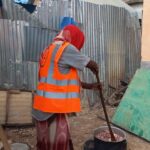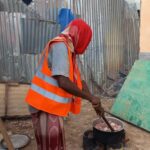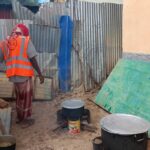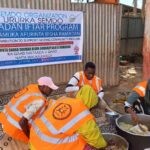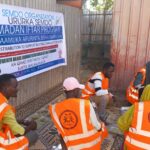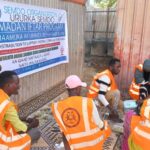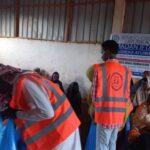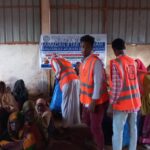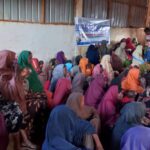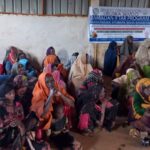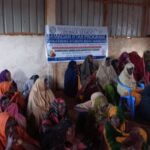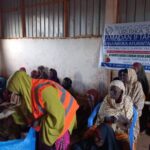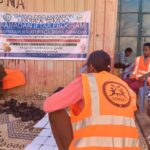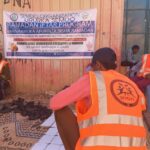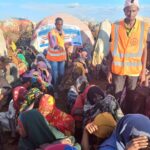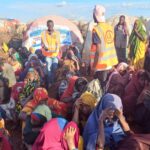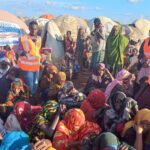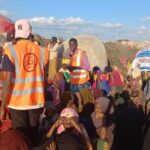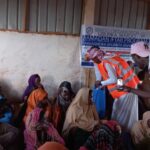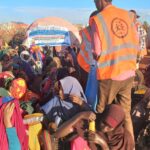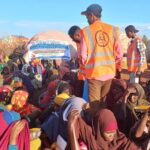
SEMDO has prior experience in implementing similar types of interventions in different regions and sectors in Somalia, such as Baidoa, in collaboration with various Personal/Welfare donors, SEMDO's previous and ongoing projects are: I.Enhancing livelihoods and business skills for Businesswomen in IDPs amd Host Communities in Baidoa Somalia, funded by SEMDO its self, which aims to mitigate the impact of multiple crises on the livelihoods of internally displaced women and other marginalized women in Somalia, protect them from exposure to gender-based violence, and participate in decision-making processes within their communities through Trainings and Workshops.
II. Empowering persons with disability: SEMDO provide assistance and support to persons with disability, who face discrimination and exclusion in accessing basic services and opportunities. SEMDO provides assistive devices, such as wheelchairs, crutches, and hearing aids, to improve the mobility and communication of persons with disability. SEMDO also provides vocational trainings, to enhance the employability and income generation of persons with disability. SEMDO also advocates for the rights and inclusion of persons with disability in decision-making in the community to processes and raises awareness on disability issues among the communities and authorities.
III.IDPs nutrition screening: SEMDO conducts nutrition screening for IDPs, who are at risk of malnutrition due to multiple and intersecting crises, such as drought, floods, conflict, and displacement. SEMDO uses mid-upper arm circumference (MUAC) tapes and weight-for-height scales to measure the nutritional status of children under five years and pregnant and lactating women. SEMDO identifies and refers the cases of acute malnutrition to the nearest health facilities or mobile clinics for treatment and follow-up. SEMDO also provides nutrition education and counseling to the caregivers and families of the malnourished children and women, and promotes exclusive breastfeeding, complementary feeding, and dietary diversity.
IV.Supporting education of IDPs: SEMDO supports the education of IDPs, who face challenges and barriers in accessing quality and inclusive education. SEMDO provides learning materials, such as textbooks, notebooks, pens, and pencils, to the IDP children and teachers, to facilitate their learning and teaching. SEMDO also provides school feeding programs, such as biscuits, Mango Drink, to the IDP children, to improve their attendance and retention. SEMDO also are trying to rehabilitate and constructs classrooms, to improve the learning environment and infrastructure of the IDP schools. SEMDO also trains and mentors the teachers, to improve their pedagogical skills and competencies. V. Ramadan Iftar program: SEMDO provides Ramadan Iftar program to the Vulnerable people in Baidoa and Nairobi-Kenya-Islii , which is a meal to break the fast at sunset during the holy month of Ramadan, to the poor and needy people in Somalia and Nairobi-Kenya-Islii, especially the IDPs and women. SEMDO provides food items, such as rice, dates, and water, to the target beneficiaries, to enable them to have a nutritious and dignified meal after a long day of fasting. SEMDO also conducts awareness campaigns and messages, to promote the values and virtues of Ramadan, such as generosity, compassion, and solidarity.
VI. Empowering graduate students through trainings: SEMDO provides trainings to the graduate students in Baidoa Somalia, who are interested in enhancing their skills and competencies for employability and career development. SEMDO provides trainings on topics such as How to choose University Facult, proposal writing, report writing, Digital marketing, communication, and leadership With Fandhaal Institute. SEMDO also provides trainings on topics such as digital skills, entrepreneurship, innovation, and value addition. SEMDO also provides mentorship and coaching to the graduate students, to guide them in their professional and personal growth. SEMDO also links the graduate students with potential employers, markets, or networks, to facilitate their job placement or business creation.
VII. Community mobilization in health, GBV and WASH: SEMDO provides community mobilization in both health and gender-based violence (GBV) also water, sanitation, and hygiene (WASH), to the target communities in Somalia, who are exposed to health risks, diseases, and violence. SEMDO organizes and facilitates community dialogues, meetings, and forums, to engage and involve the community members and leaders, such as elders, religious leaders, women leaders, and youth leaders, in the identification and prioritization of their health and GBV also WASH needs and solutions. SEMDO also organizes and facilitates awareness campaigns, workshops, and trainings, to educate and inform the community members and leaders on the prevention and response of health and GBV also WASH issues, such as cholera, malaria, HIV/AIDS, female genital mutilation, early marriage, domestic violence, rape, safe water, handwashing, and sanitation. SEMDO also organizes and facilitates referral and protection services, to support and assist the survivors and victims of health and GBV. We have conducted mobilizations relating WASH issues, such as health care, psychosocial support, legal aid, and shelter.
VIII. Participating data collection when El Nino floods started: SEMDO participated in the data collection when El Nino floods started in Somalia, which affected the livelihoods and food security of the people in Somalia, especially the IDPs and women and HHs. And other International and local NGOs conducted rapid assessments and surveys, using Kobo-collect tool through questionnaires, interviews, and focus group discussions, to collect and analyze the data on the impact and needs of the affected population, such as their food consumption, income sources, coping strategies, access to basic services and infrastructure, and protection risks. SEMDO also conducted mapping and profiling, using tools such as GPS, and Images to collect and analyze the data on the extent and severity of the floods, such as the flooded areas, the damaged crops and livestock, and the displaced population. SEMDO also shared and disseminated the data and information with the relevant stakeholders to inform and guide the planning and implementation of the humanitarian response and recovery.
IX.Attending humanitarian event in Baidoa: SEMDO attended the humanitarian event in Baidoa, which was organized by the Southwest State of Somalia Institutions, NGOs and the UN agencies, to discuss and coordinate the humanitarian situation and response in the region, especially in the context of the drought, floods, conflict, displacement. SEMDO participated and contributed to the event, by presenting and sharing its experiences and lessons learned from its livelihood and food security interventions in the region, such as the cash-based interventions, agricultural inputs, business start-up grants and training, infrastructure projects, hygiene and health interventions, vocational trainings, community engagement, protective services, and emergency response.
